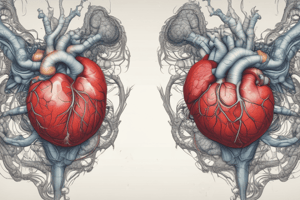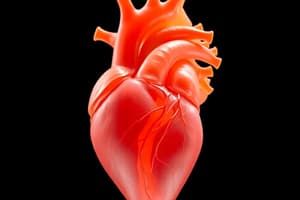Podcast
Questions and Answers
What are some symptoms of heart failure in infants?
What are some symptoms of heart failure in infants?
Breathlessness, sweating, poor feeding, recurrent chest infections.
What are some signs of heart failure in infants?
What are some signs of heart failure in infants?
Poor weight gain or faltering growth, tachypnoea, tachycardia, heart murmur, gallop rhythm, enlarged heart, hepatomegaly, cool peripheries.
What percentage of infants with significant cardiac disease have extracardiac anomalies?
What percentage of infants with significant cardiac disease have extracardiac anomalies?
25%
What is the most common system affected by extracardiac anomalies in infants with CHD?
What is the most common system affected by extracardiac anomalies in infants with CHD?
What is the relationship between extracardiac anomalies and mortality in infants with CHD?
What is the relationship between extracardiac anomalies and mortality in infants with CHD?
What is the difference between foetal circulation and adult circulation?
What is the difference between foetal circulation and adult circulation?
What are some common congenital cardiovascular abnormalities?
What are some common congenital cardiovascular abnormalities?
How can congenital cardiovascular disease present?
How can congenital cardiovascular disease present?
What is the management of congenital cardiovascular disease?
What is the management of congenital cardiovascular disease?
What is the main finding of the referenced study?
What is the main finding of the referenced study?
What is the embryological cause of atrial septal defect?
What is the embryological cause of atrial septal defect?
What is the embryological cause of ventricular septal defect?
What is the embryological cause of ventricular septal defect?
What is the most common congenital heart defect?
What is the most common congenital heart defect?
What is the embryological cause of Tetralogy of Fallot?
What is the embryological cause of Tetralogy of Fallot?
What is the embryological cause of Transposition of the great vessels?
What is the embryological cause of Transposition of the great vessels?
What is the cause of Coarctation of aorta?
What is the cause of Coarctation of aorta?
What are some risk factors for the development of congenital heart defects?
What are some risk factors for the development of congenital heart defects?
What is the embryological cause of ostium primum defect?
What is the embryological cause of ostium primum defect?
What is the embryological cause of excessive resorption of septum primum?
What is the embryological cause of excessive resorption of septum primum?
What is the embryological cause of absence of the septum secundum?
What is the embryological cause of absence of the septum secundum?




